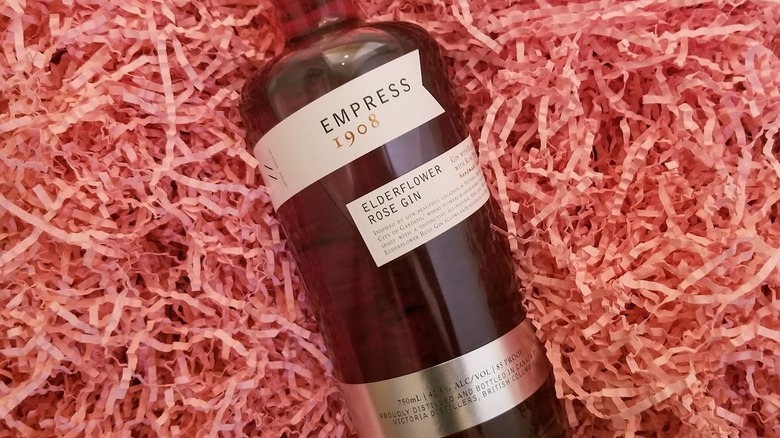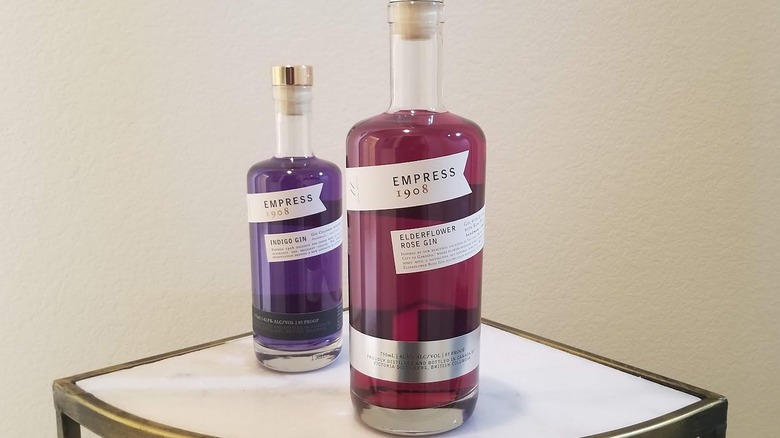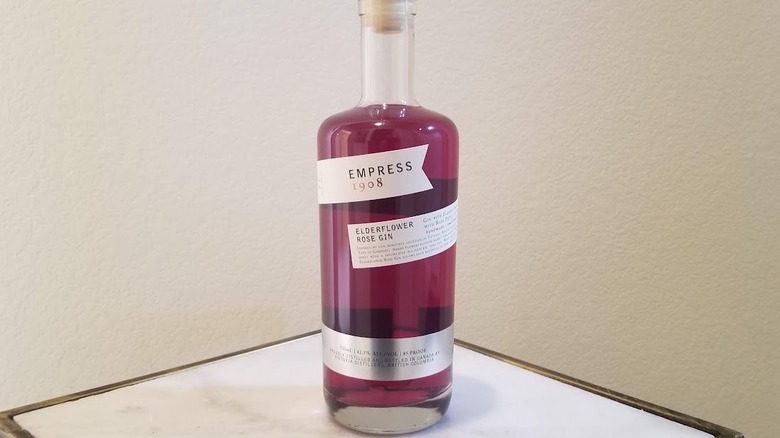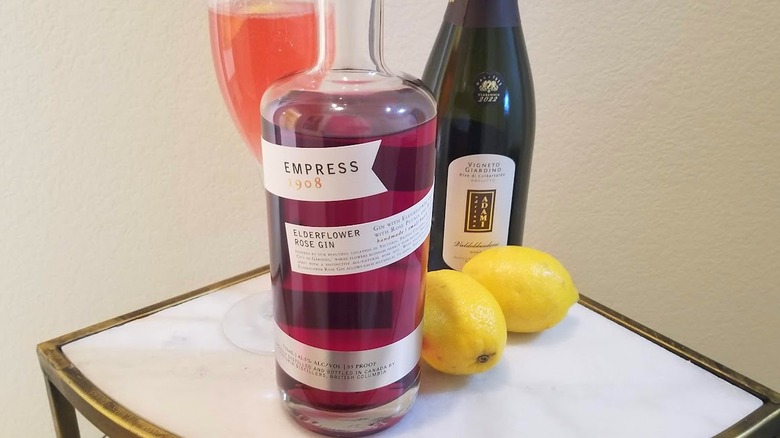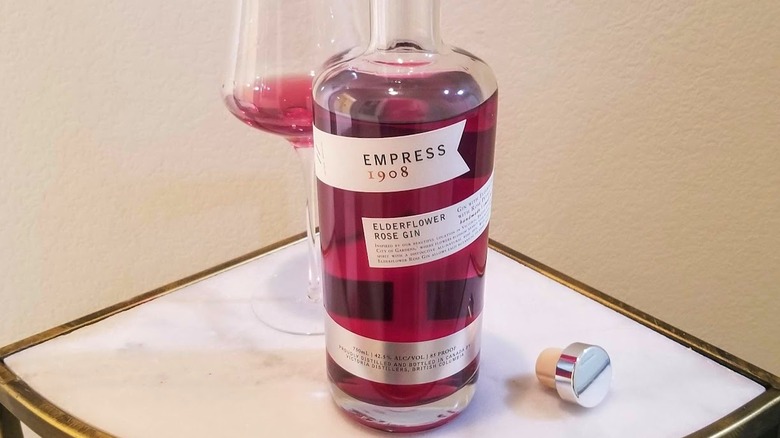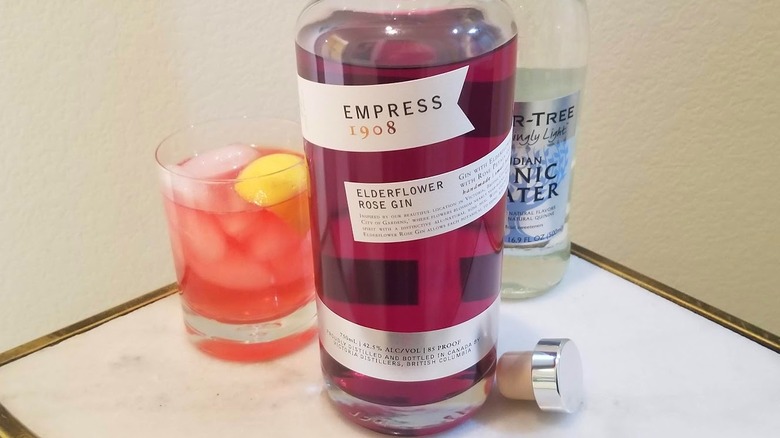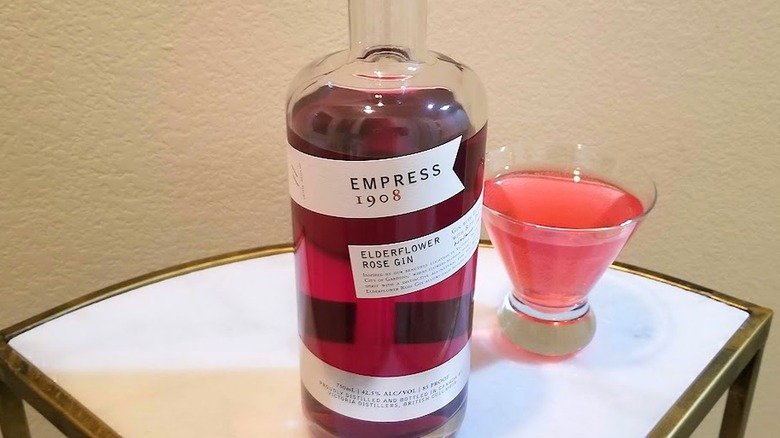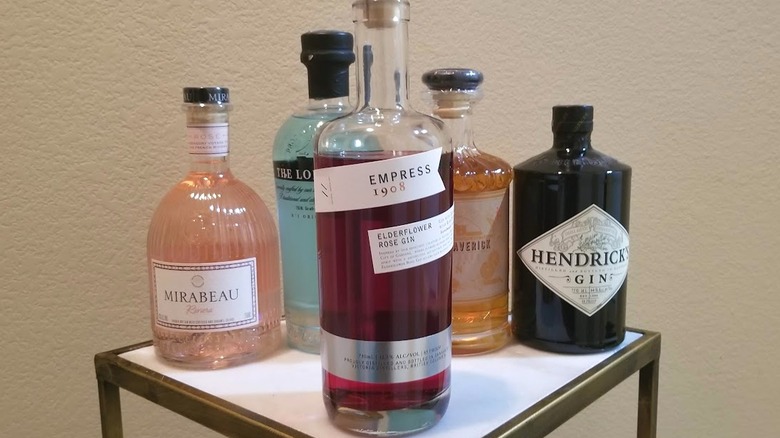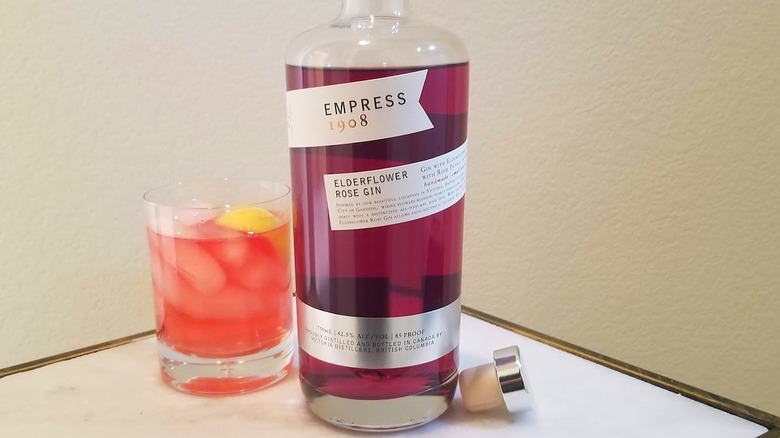Review: Empress 1908 Elderflower Rose Gin Brings A Beautifully Intoxicating Combination Of Floral Flavors And Aromas
Gin consumption in the U.S. has enjoyed a slow, steady rise through the years. Over time, the juniper-forward alcohol has gone from a supposed healing drink given medicinally to cure stomach disorders to being a key component in both classic and modern cocktails. The popularity of drinks like the negroni, martini, and gin and tonic appears to have earned the aromatic liquor a permanent place on our bar cart, as the U.S. gin market is on track to generate $1.6 billion in 2024, according to Statista.
Empress 1908 represents everything today's gin fan seeks from the spirit. Many modern consumers have begun turning to smaller production distilleries that create craft liquors with an artistic touch, after all, so it's easy to see why the Canadian brand has made its mark throughout the U.S. Victoria Distillers (the distillery behind Empress 1908 gin) understands gin drinkers prefer a product with unique flavors made from high-quality, all-natural ingredients — all of which are embraced by its new Empress 1908 Elderflower Rose Gin.
Honoring tradition while embracing modernity, Empress 1908's new flavor was released in the U.S. in the fall of 2023. We spoke with the brand's Master Distiller, Phil Lecours, about this liquor's creation, and received a sample courtesy of the company to taste test, as well. After trying this product, here are our thoughts on the new Empress 1908 Elderflower Rose Gin.
What is Empress 1908 Elderflower Rose Gin?
When the makers of Empress 1908, Victoria Distillers (based in Sidney, British Columbia, Canada) sought to expand its portfolio in 2016, it looked towards the neighboring Fairmont Empress Hotel in Victoria, British Columbia — and its afternoon tea program — for inspiration. Using the luxury property's signature tea blend (made with ethically sourced, loose-leaf teas) and butterfly pea flowers, the resulting spirit became the stylish Empress 1908 Indigo Gin. To create its new Empress 1908 Elderflower Rose Gin, the team at Victoria Distillers once again found inspiration in its local environment.
Fresh flowers bloom throughout the year in Victoria due to its moderate climate, and locals often drape baskets of flowers from lampposts — filling the streets with beauty, color, and intoxicating aromas. Taking a cue from Victoria's "City of Gardens" moniker, Victoria Distillers aimed to capture the characteristics of a fresh garden in a bottle with its latest offering.
According to Master Distiller Phil Lecours, the distillery wanted "to pay homage to where we work and live through this vibrant spirit and how it captures the essence of its gardens." Consequently, to create the new Empress 1908 Elderflower Rose Gin, the distillery combined floral notes of red rose petals, elderflower, and lavender.
What are the ingredients and nutrition?
The new Empress 1908 Elderflower Rose Gin is a highly aromatic spirit with a gorgeous, all-natural, vibrant red color. The liquor contains 70 calories per fluid ounce and zero grams of carbohydrates (the same nutrition information as its Indigo Gin). Furthermore, the spirit is certified kosher.
Its creation begins with a naturally gluten-free, corn-based alcohol. The distillery then infuses nine all-natural botanicals to create the fragrant liquor: juniper berry, red rose petals, elderflower, lavender, orange peel, orris root, cinnamon, coriander, and black carrot. As everything in this gin is all-natural, Phil Lecours and his team had to find a way to create the liquor's attractive hue without artificial colorings or additives. But having worked in the culinary field for over two decades before joining Victoria Distillers, Lecours possessed a knowledge of and appreciation for "the art of blending ingredients, aromas, and flavours" — which led him to incorporate black carrots.
The nutrient-dense vegetable contains anthocyanins: water-soluble pigments common in red, blue, and purple foods. Additionally, Lecours told us the flowering plant "not only enhances and maintains the spirit's ruby color, it brings a touch of sweetness." And that sweetness (along with the vegetable's natural earthiness) helps balance the overall taste of the gin.
How is Empress 1908 Elderflower Rose Gin made?
Phil Lecours shared the basic production methods for creating this new gin (while keeping specific details proprietary). Generally, the gin-making method begins with a 96% alcohol by volume (ABV) rectified spirit. The corn Empress 1908 uses to make its base spirit lends a natural, earthy sweetness to the dry liquor. The Master Distiller then adds a mix of juniper and other botanicals into the alcohol to infuse flavor and color, allowing the mixture to macerate for some time.
When making the small-batch Empress 1908 Elderflower Rose Gin, the distillery uses four copper pot stills for distillation — with each still's production taking four to six hours to complete. "To make a well-balanced, consistent gin, we usually combine many distillations into one batch," Lecours told us, "which typically takes weeks" (our bottle was a part of batch #11). After distillation, the gin is diluted with water to achieve a 43.5% ABV. The alcohol level is slightly higher than the 40% minimum ABV required for gin classification in the United States.
The distillery's proximity to water, along with the area's natural habitat, has always been instrumental in its sustainability approach. In fact, Victoria Distillers recaptures the heat from the water used during distillation and transfers it to the neighboring Sydney Pier Hotel using an energy-saving geothermal system. Every distillation delivers 850,000 BTUs of energy to the hotel while saving 1,500 gallons of water.
Taste testing Empress 1908 Elderflower Rose Gin
We began our taste test by trying Empress 1908 Elderflower Rose Gin neat in a tulip-shaped wine glass. Thanks to the glass's large bowl (which narrowed towards the top), the concentrated aroma allowed us to fully experience its botanicals. Now, given the rich, magenta-red color of the gin and the fresh floral scent found when breathing it in, it's easy to imagine the taste will be cloyingly sweet. However, the gin is quite dry.
Swirling the glass helped dissipate the initial alcohol burn and revealed a potpourri of flavors — akin to walking through a blooming garden. These floral notes are distinct and ever-present throughout the gin, though the flowers lend additional characteristics beyond their perfume. The delicate white elderflowers bring natural citrus and honey flavors, the rose petals lend a taste of apples and red berries, while lavender brings an herbal note.
Additionally, the other botanicals — including the citrusy qualities derived from the orange peel, the spiciness of the coriander and cinnamon, and the subtle bitterness added by the orris root — create balance in the overall flavor. These attributes combine with the underlying woodsy, pine needle qualities of juniper, and a subtle scent of herbs de Provence lingers throughout the background of the spirit. The result is a multi-layered, highly aromatic gin with a smooth, unctuous texture and lengthy finish.
What is the best way to enjoy the gin?
We found the best way to enjoy Empress 1908 Elderflower Rose Gin is to let the natural flavors shine with minimal additional ingredients. This means the new Empress 1908 spirit works well in various classic cocktails, like a Tom Collins with lemon and seltzer, or a refreshing French 75 with lemon and sparkling wine. In a classic negroni, The gin's floral characteristics help soften the bitter orange flavors of Campari while melding with the vermouth's infusion of botanicals – becoming the perfect aperitif to start an evening.
Another enjoyable way to drink this liquor is by mixing it into a gin and tonic cocktail — one made with high-quality tonic water that isn't too sweet (hink Fever Tree Indian tonic water). This type of drink tends to have enough bitterness to balance the gin's floral notes while lifting the liquor's fruit and spice characteristics.
However, unlike its sister, Indigo Gin (which changes from a deep lapis lazuli blue to shades of pink or purple depending on the mixer), the rich red color of the Elderflower Rose Gin merely softens to lighter pink shades when combined with mixers. Additionally, because Empress 1908 Gin is an all-natural product, it's worth noting that while the flavor will remain intact, this liquor's color will fade over time. This is especially likely if the bottle is exposed to bright ambient light or sunlight, so it's best to drink the gin within the first year.
What is the price and availability?
Historically, gin was often known as an inexpensive, quick, and easy-to-make liquor. After all, it's typically unaged and only really requires one ingredient — juniper berry — beyond whatever array of herbs, spices, and botanicals are used by a distiller. Homemade gin kits even exist, allowing folks to create the spirit in the comfort of their home. But modern specialty gin distilleries — like Victoria Distillers — take things a little slower and incorporate a craftsman's approach when creating the alcohol.
Given its producer sources high-quality, all-natural ingredients to give its gin products an authentic flavor without artificial additives, the suggested retail price of Empress 1908 Elderflower Rose Gin is $39.99 for a 750-milliliter bottle. While this is the same price as the company's Indigo Gin, it's not exactly cheap. Of course, even if the price is more expensive than some other popular brands of gin on the market, the aforementioned production process explains the premium cost of Empress 1908.
Empress 1908 first released its newest gin flavor in Canada in the spring of 2023. It became available in the U.S. in September 2023 with nationwide distribution, and you can purchase this selection on the Empress 1908 website, as well. In addition to its 750-milliliter bottle, select retailers may carry a 375-milliliter bottle (averaging $25 per bottle) and a 1-liter bottle (which will cost around $55).
How does Empress 1908 Gin compare to other craft gins?
Including flowers in the flavor blend when making gin is fairly standard. Many products include floral components like jasmine, honeysuckle, and citrus blossom. Roses are a key addition to the botanical blend for gins like Hendrick's, Nolet's, and Mirabeau Dry Gin while being a dominant flavoring in Glendalough Rose Gin and Bayab African Rose Water Gin. Elderflowers are also becoming an increasingly popular inclusion, as in options from Bluecoat and Edinburgh Gin.
Still, the total mix of ingredients in Empress 1908 Elderflower Rose Gin — particularly the elderflower and black carrot — set it apart from other brands. Elderflower's delicate aromas and sweet, summery taste meld naturally with the spicy, piney juniper berry flavors. At the same time, the earthy, slightly sweet black carrot gives depth, while the orange peel adds zesty freshness. The additional botanicals round out the flavor profile, creating an all-natural, strikingly unique gin.
Is Empress 1908 Elderflower Rose Gin worth buying?
Empress 1908 Elderflower Rose Gin provides a feast for the senses. Its eye-catching color and sleek packaging spark your initial interest while its intoxicating perfumed aromas draw you in. Its delicious yet unique taste makes you stop and think, contemplating the blend of botanicals creating the layers of flavor. At the same time, the velvety smooth, luscious texture keeps you engaged and returning for more.
This flavored gin will bring a refreshing twist to seasonal punch cocktails and give your evening martini a flowery makeover. It may not be the liquor you enjoy every night, and it's unlikely to impress consumers who inherently don't care for the woodsy flavor of juniper or shy away from cocktails that leave a floral impression. Still, the adventurous gin drinker who enjoys something out of the ordinary will enjoy the new Empress 1908 Elderflower Rose Gin.
This spirit deserves a place in your liquor cabinet (albeit stored away from the light to keep the color intact). With its herbal and wildflower qualities, Victoria Distillers achieved its goal of producing the essence of an aromatic garden in the form of a drink.
